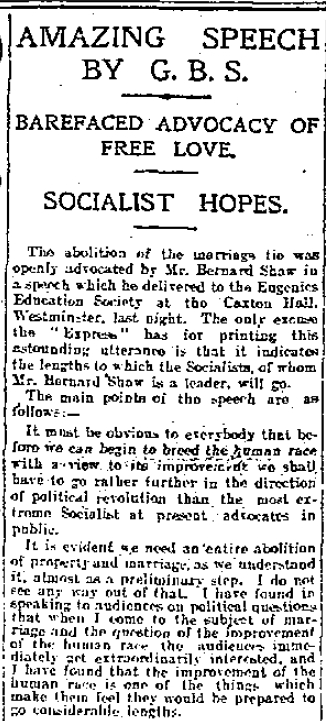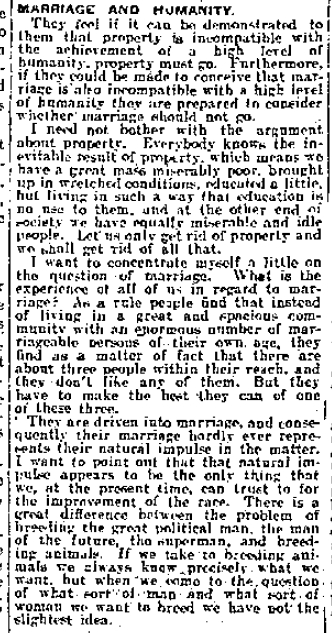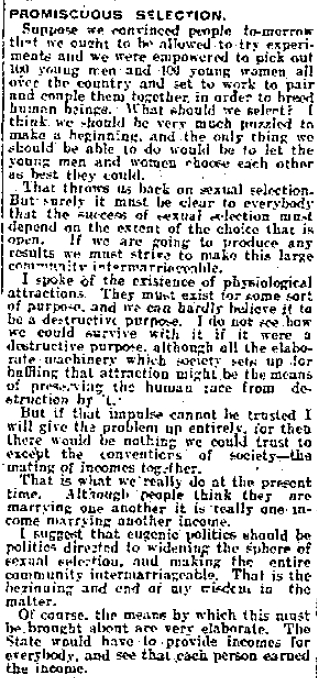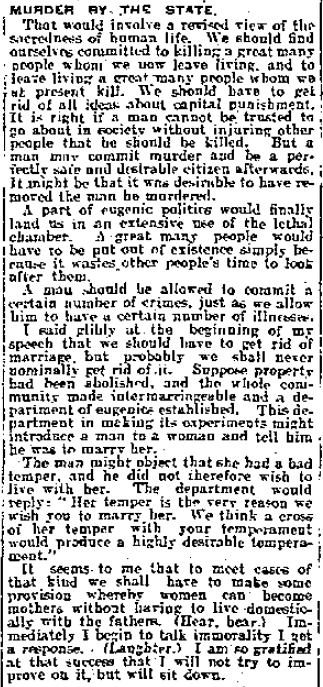The following article was found in the March 4th edition of The Daily Express in 1910. Reproduced under Fair Use Provisions.
If anyone has any corrections they would like to post to the text (which was hard to read) please pass them along. Images of the most readable text are at the end of this document.
————
Amazing Speech by G. B. S.
Barefaced Advocacy of Free Love
SOCIALIST HOPES
The abolition of the marriage tie was openly advocated by Mr. Bernard Shaw in a speech which he delivered to the Eugenics Education Society at the [Caxton] Hall, Westminster, last night. The only excuse the “Express” has for printing this astounding utterance is that it indicates the lengths to which the Socialists, of whom Mr. Bernard Shaw is a leader, will go.
The main points of the speech are as follows:–
It must be obvious to everybody that before we can begin to breed the human race with a view to its improvement we shall have to go further in the direction of political revolution than the most extreme Socialist at present advocates in public.
It is evident we need an entire abolition of property and marriage as we understand it, almost as a preliminary step. I do not see any way out of that. I have found in speaking to audiences on political questions that when I come to the subject of marriage and the question of the improvement of the human race the audiences immediately act extraordinarily interested, and I have found that the improvement of the human race is one of the things which make them feel they would be prepared to go considerable lengths.
Marriage and Humanity.
They feel if it can be demonstrated that property is incompatible with the achievement of a high level of humanity, property must go. Furthermore, if they could be made to conceive that marriage is also incompatible with a high level of humanity they are prepared to consider whether marriage should not go.
I need not bother with the argument about property. Everybody knows the inevitable result of property, which means we have a great mass miserably poor, brought up in wretched conditions, educated a little, but living in such a way that education is no use to them, and at the other end of society we have equally miserable and idle people. Let us only get rid of property and we shall get rid of all that.
I want to concentrate myself a little on the question of marriage. What is the experience of all of us in regard to marriage? As a rule people find that instead of living in a great and spacious community with an enormous number of marriageable persons of their own age, they find as a matter of fact that there are about three people within their reach, and they don’t like any of them. But they have to make the best they can of one of these three.
They are driven into marriage, and consequently their marriage hardly ever represents their natural impulse in the matter. I want to point out that the natural impulse appears to be the only thing that we, at the present time, can trust to for the improvement of the race. There is a great difference between the problem of breeding the great political man, the man of the future, the superman, and breeding animals. If we take to breeding animals we always know precisely what we want, but when we come to the question of what sort of man and what sort of woman we want to breed we have not the slightest idea.
Promiscuous Selection.
Suppose we convinced people to-morrow that we ought to be allowed to try experiments and we were empowered to pick out 100 young men and 100 young women all over the country and set to work to pair and couple them together in order to breed human beings. What should we select? I think we should be very much puzzled to make a beginning, and the only thing we should be able to do would be to let the young men and women choose each other as best they could.
That throws us back on sexual selection. But surely it must clear to everybody that the success of sexual selection must depend on the extent of the choice that is open. If we are going to produce any results we must strive to make this large community intermarrieagable.
I spoke of the existence of physiological attractions. They must exist for some sort of purpose, and we can hardly believe it to be a destructive purpose. I do not see how we could survive with it if it were a destructive purpose, although all the elaborate machinery which society sets up for [baffling; that attraction might be the means of presrving the human race from destruction by [L]
But if that impulse cannot be trusted I will give the problem up entirely, for then there would be nothing we could trust to except the conventions of society–the mating of incomes together.
That is what we really do at the present time. Although people think they are marrying one another it is really one income marrying another income.
I suggest that eugenic politics should be politics directed to widening the sphere of sexual selection, and making the entire community intermarriageable. That is the beginning and end of my [wisdom] in the matter.
Of course, the means by which this must be brought about are very elaborate. The State would have to provide incomes for everybody, and see that each person earned the income.
Murder by the State.
That would involve a revised view of the sacredness of human life. We should find ourselves committed to killing a great many people whom we now leave living, and to leave living a great many people whom we at present kill. We should have to get rid of all ideas about capital punishment. It is right if a man cannot be trusted to go about in society without injuring other people that he should be killed. But a man may commit murder and be a perfectly safe and desirable citizen afterwards. It might be that it was desirable to have removed the man he murdered.
A part of eugenic politics would finally land us in an extensive use of the lethal chamber. A great many people would have to be put out of existence simply because it wastes other people’s time to look after them.
A man should be allowed to commit a certain number of crimes, just as we allow him to have a certain number of illnesses.
I said glibly at the beginning of my speech that we should have to get rid of marriage, but probably we shall never nominally get rid of it. Suppose property had been abolished, and the whole community made intermarriageable and a department of eugenics established. This department in making experiments might introduce a man to a woman and tell him he was to marry her.
The man might object that she had a bad temper, and he did not therefore wish to live with her. The department would reply: “Her temper is the very reason we wish you to marry her. We think a cross of her temper with your temperament would produce a highly desirable temperament.”
It seems to me that to meet cases of that kind we shall have to make some provision whereby women can become mothers without having to live domestically with the fathers. (Hear, [hear]) Immediately I begin to talk immorality I got a response. (Laughter) I am so gratified that I will not try to improve on it, but will sit down.






1 ping
[…] places to start: the Fabians, such as George Bernard Shaw… yes, the playwright! … who wrote in […]